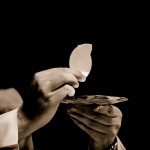 Growing up, I was drawn to the musical and harmonically-inclined geniuses Simon and Garfunkel. I particularly enjoyed their lyrics and found them to be philosophically rich and deep. I mean, who doesn’t want to be a hammer rather than a nail? Ok, a bit of tongue-in-cheek, but I digress. The did commit one line to heart and soul and have been struggling to undo it every since: “I am a rock, I am an island.”
Growing up, I was drawn to the musical and harmonically-inclined geniuses Simon and Garfunkel. I particularly enjoyed their lyrics and found them to be philosophically rich and deep. I mean, who doesn’t want to be a hammer rather than a nail? Ok, a bit of tongue-in-cheek, but I digress. The did commit one line to heart and soul and have been struggling to undo it every since: “I am a rock, I am an island.”
Here’s the deal: I’m selfish, self-centered, self-absorbed, and self-deluded. Aren’t we all? Isn’t that one of the interpretations of sin: that we are bent or curved in upon ourselves (incurvatus in se)? Some people have learned to “adult” better than others by being more focused on the Other than the Self. I’m not there. But I’m trying.
I was praying this morning through Saint Augustine’s Prayer Book and The Benedictine Handbook and I marveled once more at the we-language of liturgy rather than the I- or me-language that so pervades our culture and wayward hearts. It hit me:
There are no liturgical islands.
This isn’t a ground-breaking discovery, and perhaps it says more about me than it does about you or the nature of liturgy, but it is crucial to our understanding of prayer and worship. Liturgies, both those used for Sunday Eucharist and personal use in the Hours, are communal, are plural, are an inclusion of the self in the whole. We participate in the worshipping life of the Church and therefore in the life of the Trinity. We—and please note that it is “we”—pray for the needs of the world, those around us, those in authority over us, the church, and so much more. The amount of time and breath devoted to “personal prayer” is small…and that’s not an accident.
Admittedly, I often use liturgical prayer as an escape from. It might be an escape from myself, from my day, from my troubles, from other people but it is always as escape. Yet, by the grace of God, that intentional escape is always transformed into an invitation, an inclusion into something far greater than myself. I don’t lose who I am as though I am irrelevant but rather I am placed into proper perspective, His perspective and it makes all of the difference.
As I go to pray because I feel the need for peace, calm, quiet, and reflection, I always leave with a sense of having forgotten myself and my worries or troubles. Liturgical prayer helps me to undo the inward-bent of my heart and realigns my life (read: heart, body, mind, soul, and more) with the Kingdom and reign of the Triune God.
There are no liturgical islands, friends. You are neither an island nor a rock. You are a child of God, an inheritor of the Kingdom, a member of the body. You are part of something greater than yourself and your prayer time should help you realign with proper perspective.












